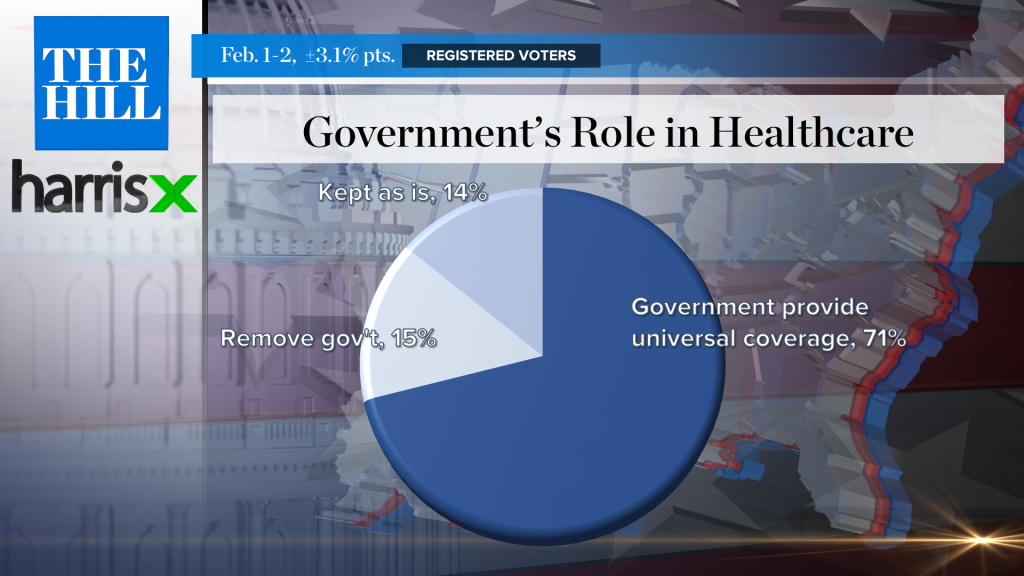A new poll finds that about only one in 10 registered voters want the equivalent of Medicare for all if it means abolishing private health insurance plans.
 In a Hill-HarrisX survey released Thursday, 13 percent of respondents said they would prefer a health care system that covers all citizens and doesn’t allow for private plans, an approach that is sometimes referred to as “single-payer.”
In a Hill-HarrisX survey released Thursday, 13 percent of respondents said they would prefer a health care system that covers all citizens and doesn’t allow for private plans, an approach that is sometimes referred to as “single-payer.”
The most popular option, at 32 percent, consisted of a universal, government-operated system that also would allow people to buy private, supplemental insurance.
Twenty-six percent of respondents said they wanted a government insurance plan offered to all citizens, but one that doesn’t compel people with private plans to use it, a system sometimes called a “public option.”
A small minority of 15 percent of voters said they wanted the government to completely remove itself from paying for health care, while another 14 percent said they want to keep the existing health care system intact.
 “Folks are clearly saying the system is still sort of broken to some degree, but there isn’t a lot of consensus around how to fix it in one way or another,” Mohamed Younis, editor-in-chief of Gallup, told Hill.TV’s Krystal Ball on Wednesday.
“Folks are clearly saying the system is still sort of broken to some degree, but there isn’t a lot of consensus around how to fix it in one way or another,” Mohamed Younis, editor-in-chief of Gallup, told Hill.TV’s Krystal Ball on Wednesday.
Health care policy is proving to be a challenging issue in both parties. Democrats broadly agree that everyone should be covered, but there have been disagreements over how to achieve that.
Sen. Bernie Sanders (I-Vt.) has pushed for universal coverage, while some Democratic White House hopefuls have begun to argue that his Medicare for all plan is not feasible.
Legislation proposed by Sanders would largely eliminate private coverage and replace it with government coverage for everyone. There would still be a very limited role for private supplemental coverage for procedures like cosmetic surgery.
Potential 2020 candidates like Sen. Sherrod Brown (D-Ohio) have argued in favor of a partial expansion of Medicare, while others such as Sens. Kamala Harris (Calif.) and Sen. Kirsten Gillibrand (N.Y.) have said single-payer is their goal, adding that they also support programs that would ease the economic transition to that system.
Conservative and libertarian activists have long preferred that the government be removed entirely from the health care industry. That position, however, has never garnered broad support. A Washington Post-ABC News poll in November found that Democrats were more trusted than Republicans to handle health care, by a 16-point margin.
Even Republican voters seemed to disagree with certain conservative ideology on health care. The Hill-HarrisX survey found that 26 percent of GOP voters said they wanted the government to stop paying for health care, while a total of 53 percent favored some form of universal government-provided insurance. Twenty-one percent said they want to keep the current health care system in place.
The issue of expanded government health care has also played out at the state level, where some GOP-controlled legislatures have seen their positions against Medicaid expansion under the 2010 Affordable Care Act overturned by voters in ballot measures. Republican officials in Idaho and Utah are currently seeking to curtail voter-approved Medicaid expansions amid legal threats against their efforts.
The Hill-HarrisX survey was conducted among a statistically representative sample of 1,001 registered voters from Feb. 1-2. It has a sampling margin of error of 3.1 percentage points.
—Matthew Sheffield
hilltv copyright
